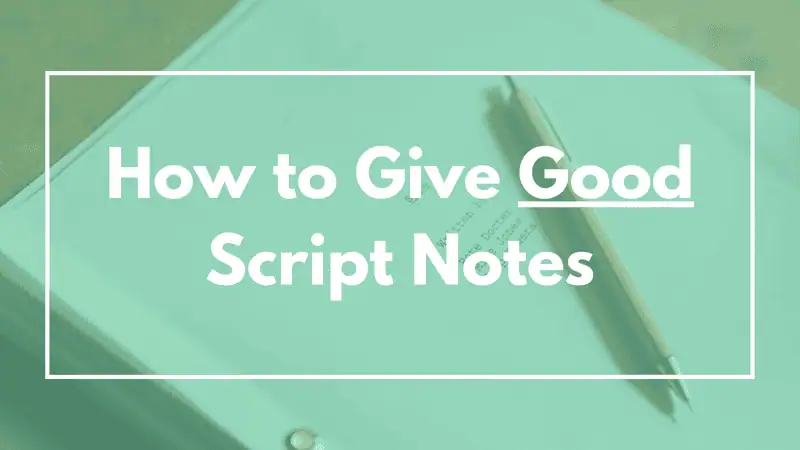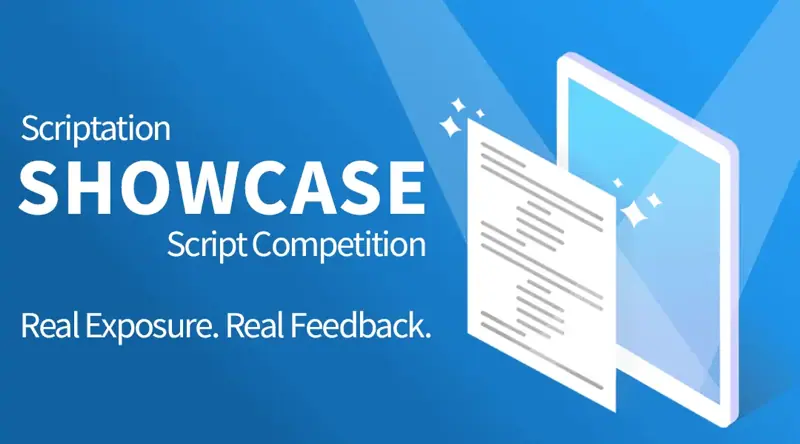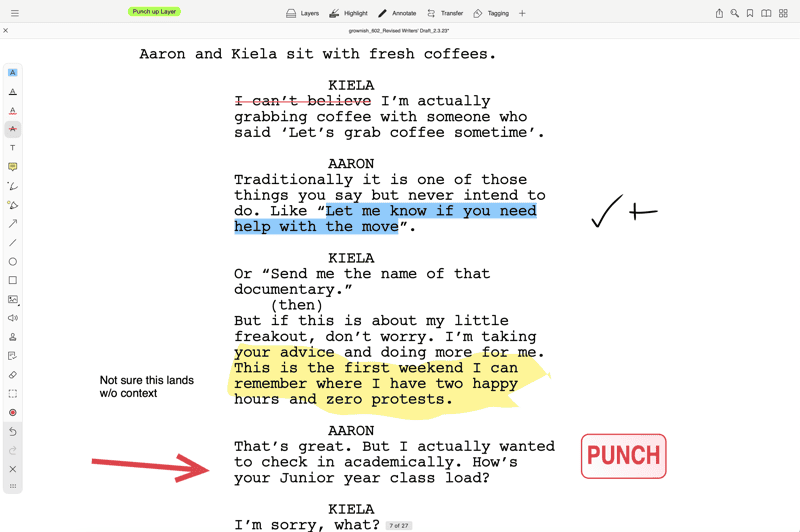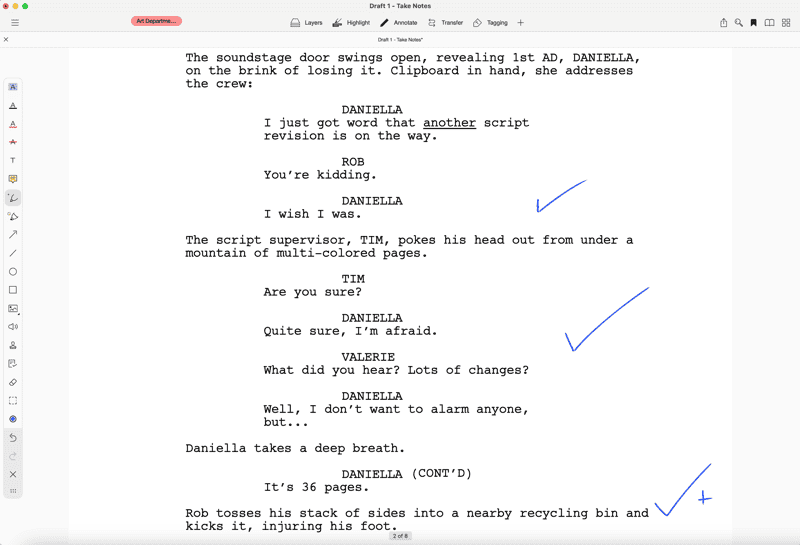You got the email, text, or in-person ask – “Can you read my script?” You’ve said yes (willingly or otherwise) and now it’s time to make the script notes. But how do you give good script notes? Do you rage against the dying of the light comedy, or go light on the criticism? Also, what constitutes good script feedback? What’s a bad script note example even look like? Is it just a lot of things in all caps?
Well rest easy, dear future script noter, as we are about to take you through some of the basics to how to give good script notes for both the new and experienced screenwriters alike.
HOW DO I GIVE SCRIPT NOTES?
1. READ THE SCRIPT
As is the case with most aspects of screenwriting, everything starts with the writing on the page. Once you have the file from the note requester (who even hands out hard copies anymore?), find a time to sit down and read. Simple, we know, but the best script notes come from someone who has a true understanding of what they’re giving feedback on. Only a strong understanding of the material can offer the best ways to alter it.
It’s also to know how you’re reading the script. The best way to keep everything in one place is to use a script annotation app, like Scriptation:
If there’s time – and when is there ever, really – you’ll want to first read the script, and then read it a second time for a true notes pass. The first read gives you a sense of the story, the characters, and the level of writing you’re dealing with. You’ll have some big-picture thoughts – “Bring up the alien sooner” or “Do they have to die in the end?”– which you’ll then add to your collection as you dig in to specific notes in the notes pass. That’s when you really dig into what you think, how you’d change things, and how the writer did on delivering their intended message.
SCRIPT FEEDBACK TOOLS
2. WHO ARE THE NOTES FOR?
There are a variety of different script feedback mediums, and it’s important to know what kind of notes you’re dealing with before you bust out the red pen – or red ink with your Apple pencil. Script notes are a version of advice, and you wouldn’t give the same advice to your best friend that you’d give that co-worker who you think has kids. You can break down who your feedback is going to no matter the medium (comedy, drama, dramedy, comedy – funny) or format (spec, episodic, feature, short) into these basic groups:
1) Your Writer Bestie: You can trust this person with your worst drafts, and they in turn do the same with you. You know what you’re reading can be better, and that’s not usually the point; the point is to give your friend the type of feedback they need (more on that later). You’re not stopping on page one of this script and saying, “Come back when it’s better,“, that’s a script note for someone else to give at a later stage. You’re there to get through it, and hopefully through your excellent script noting ability, help make it better.
2) Your Co-worker (who may or may not have kids): This goes for all the mini rooms, TV shows, incubators and brain trusts, you name it- but ‘it’ is something you’re both getting paid for. You have to read this screenplay, front to back, and have thoughts on it all. Your notes also need to be somewhat professional, elevating ‘do better‘ to trusted script thoughts like ‘take a look at this’ or ‘this didn’t land for me‘. Remember also, this person is likely going to have your script in their sights in the future; so the more good you can give them for the page, the more good you’re likely to get back for your own.
3A) Person you Kind of Know (Below the Line): This covers your writers’ groups, favors, cousins of a friend, or anyone you kind of know but don’t work with and certainly haven’t read before. You can be as harsh or soft as you decide the writing needs, but be careful. Today’s favor reads can become tomorrow’s Showrunners.
3B) Person you Kind of Know (Above the Line): This fun one covers people with more success than you, who have asked you to read their work. It’s smart to treat these reads as a test; can you give honest feedback that protects you if they’re thin skinned? Can you give the real criticism they need, and could possibly be hoping to get? Be honest, be aware of your situation, and when you can, compliment.
4) Script Contest: You need to read it, the whole script, and judge based on the criteria of the contest you’re representing. New writer focus? Be lenient. Best of the Best? Then the writing better be.
And here’s your reminder that one of the best and most respected screenplay contests out there today is the Scriptation Showcase. Enter their TV, Feature, or Short competition today!
SCRIPT FEEDBACK TRICKS
3. GIVING GOOD SCRIPT NOTES
You’ve read the script, and know who the notes are for. Now you need to decide what format your script feedback will take. Page notes? Long write up? Annotated PDF? Well you know which one we’re going to vote for – and thanks to Scriptation’s Layers feature, you can make point-specific script notes in Layers.
You can break down your feedback to individual note layers tackling everything from big picture ideas, script cuts, tone, dialogue pitches, joke alts, any category you think will help the writer best receive the feedback.
Good script notes identify problems, as well as providing potential solutions; if a scene seems to not be working, suggesting ways to smooth it out will help more than writing ‘clunky AF’ in the margins. Similarly, production notes like ‘we can’t afford a helicopter’ are aided with ‘but we can afford a helicopter landing pad’. Learn how to pitch a fix, and watch your reputation as a great script note giver grow.
Here’s a script note example of an annotated page using Scriptation’s tools:
With each script note you give, remember how your purpose is to make the screenplay better. Whether that’s with clarity, plot reminders, bigger jokes, adjusting tone, or even the helpful typo catch, you want to make it absolutely clear what you’re trying to say in your note. Brevity and simplicity are a phenomenal script note givers best tools (besides Scriptation).
HOW TO DELIVER SCRIPT NOTES
4. DELIVERING YOUR SCRIPT NOTES
Once you’ve committed your script notes to the PDF, give them a once over to make sure they make sense after the fact; not just in the moment you wrote them. Then it’s beyond helpful to deliver a summary of your big thoughts along with the notes themselves, where you sum up the headlines, ‘This worked, this didn’t, I liked this, this I liked less’, ‘does it have to be an old mill?’
That’s the best way to deliver your messaging separate from the script page. A helpful tone and an inspiring message reminding the screenwriter that true writing is revising goes a long, lone way in helping those big notes go down a lot smoother. Now there are of course options on how to get the notes to the screenwriter:
IN PERSON – If you do this, they should be buying you a coffee (small ask), a meal (big ask), or a vacation (you just saved the multi-billion dollar franchise by saying, ‘What if it was a baby Yoda’?). This is mostly talking big picture thoughts, before sending along the file/page notes…
BY PHONE – Like in person, but no free java, burger, or go bag. You may have already sent the noted PDF ahead of time to walk through any question areas or specifics you wished to elaborate on.
BY ZOOM – Like the above two, but with the option of pulling the script file up either as a PDF to review notes, or the writing file to make changes.
BY TEXT – Good for headlines. Especially good ones! Harsh for big notes. What, you couldn’t email me?
BY EMAIL – The most common delivery system, that accompanies almost every option, where you typically write your big thoughts in the body of the email, maybe throw in a few page-specific notes, and the file with specific notes is attached (don’t forget to attach the file).
Now is the time to mention the need for a service that delivers a “Hey, great job! I’m sure they’ll love it.” text whenever you send a script out to get read. We’ll make tens of dollars.
SCRIPT NOTES FORMAT
5. THE SCRIPT NOTES FOLLOW UP
The best and caring screenplay feedback provider will of course leave the door open for the writer to reach out with any and all follow ups they may have from reviewing your thoughts.
What did you mean by… can come up a lot if you have bad handwriting (score another point for the script PDF annotation method).
When you say… is a way for the writer to try to get you to undo the note you gave by explaining the story point or dialogue in a different way.
I wanted to run something by you… is when the writer has a fix, but isn’t sure it will work. Usually, it hits the mark. Sometimes, it doesn’t.
Unless you’re working on a show together or this person has given you a kidney, you don’t traditionally then read the script again. Your watch has ended. Cue the violins. On to Cincinnati.
SCRIPT FEEDBACK TOOLS
6. COMEDY SCRIPT NOTES
While we touched on this briefly above, for comedy script notes you also will likely want to include some JOKE PITCHES. If it’s a good friend’s script your reading, they’ll welcome your suggestions. If it’s your co-worker, again, this is your job. And if it’s someone with no professional writing experience doing their best, showing them how to cleanly get to the joke they may be trying to make is invaluable. Plus, it’s great practice for any comedy writer to work on punch up, ie, taking a joke and making it better.
Also, you need to include the CHECKS. Not bank note checks, checks for what made you laugh.
Small Check – Nice.
Big Check – NICE!
Check Plus – DUDE! Nice. NICE!
Some folks will try the two checks, but who are you fooling? Just go big check/check plus and move on. Check-lislovakia, Yu-check-istan, Checks Mix, all have been said in a writers’ room to a writer who had a lot killer jokes. I guess you had to be there, it made sense.
BEST NOTING APPS
7. SCRIPT CUT NOTES
There’s also a world of script notes all about less is more; the world of editing that is Script Cuts. You can read all about the different mindset, etiquette, and technique of the cut pass and more in our blog post about How to Edit a Script.
Here’s more great advice from writer Michael Jamin on how to give good script notes:
SCREENWRITING NOTES FOR STUDENTS
8. AND FINALLY…
One of the very best aspects of reading someone’s scripts and giving good notes, is that they will now read yours! If someone has read your script, it is but a common courtesy to return the favor when the time comes. Like anything in film and TV writing, the more practice you get the better skills you’ll have.
So Happy Noting! And don’t be too stingy with the checks.
Want to know more about the screenwriting process, from writing to cuts to editing? Then be sure to stay tuned to the Scriptation blog!




